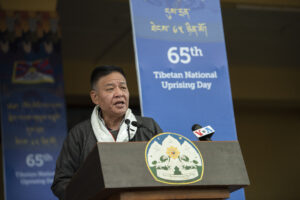Dharamshala: On this day, sixty five years ago in 1959, the people of Tibet from the three traditional provinces rose in protest against the repression of the Chinese communist forces in capital Lhasa. Today also marks the thirty-fifth anniversary of the Martial Law imposed on 5th March 1989 after repeated peaceful protests in Lhasa in 1987, 1988 and 1989, and the sixteenth anniversary of the peaceful protests that erupted across Tibet in 2008. And since 2009, 157 Tibetans are known to have self-immolated for more freedom inside Tibet and for the return of His Holiness the Dalai Lama to Tibet. On this solemn occasion, we remember and offer our prayers in honour of our compatriots who have given their lives for the cause of Tibet. We stand in solidarity with those who are still suffering under the brutal occupation of the People’s Republic of China.
Today, as we contemplate on the future of Tibet, we cannot ignore the developing events in Tibet and beyond. Currently, the ongoing Russia’s invasion of Ukraine has exceeded two years; war between Israel and Hamas in Gaza has engulfed Eurasia. The powerful nations continue to forge alliances and China’s economy continue to decline. Increasing and intensified suppression of fundamental rights of Tibetans and implementation of oppressive policies have resulted in an unprecedented threat to the survival of distinct Tibetan national identity.
The PRC government’s policy of exterminating the Tibetan identity since its invasion of Tibet has continued unabated for over seventy years. In the last decade, the PRC government has extensively expanded its pervasive communist party organisations to the grassroots level, accelerated massive population transfer within and outside Tibet and tightened control over movements and daily lives of Tibetans by sending tens of thousands of “work teams” across Tibet. With surveillance through the grid management system, Tibetans are compelled to spy on each other. Externally, Tibetans are threatened with transnational repression. The PRC government is vigorously pursuing a policy of “forging a strong sense of the Chinese as one single identity” by erasing the Tibetan identity; promotion of Chinese language by banning and minimising the teaching and use of Tibetan language and sinicisation of Tibetan Buddhism. Reinterpreting and conforming the content of Buddhist canons to suit communist ideology and manipulation of monastic discipline and subjecting every Tibetan and every household to “patriotic re-education” campaign are aimed at eradicating Tibet’s distinct religion, culture and language. The Kashag has highlighted these policy measures and its implementation in its previous statements.
The PRC government has issued various regulations and policy documents that contravene the foundational principles of the Chinese Constitution and Law on Regional National Autonomy. On this occasion, the Kashag would like to highlight how these regulations and policies are being used to erode the Tibetan language and religion.
1. Marginalisation of Tibetan Language
The Chinese Constitution and Law on Regional National Autonomy guarantees the autonomous regions to enact regulations on the exercise of autonomy and separate regulations. The so-called ten “Tibetan Autonomous Prefectures” and two “Autonomous Counties” incorporated into China’s Qinghai, Sichuan, Gansu and Yunnan Provinces have declared regulations autonomously in their respective areas in 1980s. However, the so-called Tibet Autonomous Region (TAR) has not enacted such regulations until now.
Although the governments of Tibetan autonomous areas are given less legislative power than Chinese provinces, regulations of autonomous prefectures and counties stipulate that the heads of various organs of government must be a Tibetan; organs of autonomous area must use both Tibetan and Chinese as official languages when performing their functions; the Tibetan and Chinese languages be used for recruitment examination; Tibetan language must be the main medium of instruction in primary and middle schools; Tibetan language professional and curriculum for specialised courses in Tibetan in universities and vocational schools in their respective areas, and the organs of government must carry forward the Tibetan traditional culture. Similarly, the Tibetan Language Work Regulation enacted in the 1990s facilitated the autonomous areas to establish offices to implement learning and use of Tibetan language. Textbook editorial offices were established by respective provinces or through collaboration of provinces and autonomous region.
Likewise, a mechanism for learning, use and promotion of Tibetan language on a trial basis was announced in 1987. It stipulated that Tibetan should be the medium of instruction at primary and middle schools; lower level government offices can refuse to acknowledge receipt of official letters from higher offices if they are not written in Tibetan and lower level offices can write their official letters to higher offices in Tibetan. However, the contents of the document were revoked through amendments in 2002 and 2019. Instead, it was formulated that “courses in compulsory education shall be in Tibetan and Chinese languages”, thereby, reducing the status of Tibetan to an optional language.
As stipulated in the Chinese Constitution, the “Law on the National Standard Spoken and Written Language” guarantees that “all nationalities have the freedom to use and develop their own language”. Similarly, the Education Law and the Law on Regional National Autonomy and Compulsory Education Law of 1986 stipulate that “schools and other educational institutions with mainly ethnic minority students may use of their own language for teaching”. However, the provisions that mandate the use of their own spoken and written languages for teaching were withdrawn when Compulsory Education Law was revised. Similar provisions in regulations of autonomous areas, prefectures and counties were either altered or abrogated as can be seen in Malho “Tibetan Autonomous Prefecture” regulation of 2021 and Tibetan language work regulation of 2023.
As the laws framed by the Chinese Central Government on learning and use of Tibetan language contradict themselves, the contents of regulations of the autonomous region, prefectures and counties contravene one another. Irrespective of whether China is governed by law or not, the laws formulated by the Chinese central government either in violation of the Constitution and the Law on Regional National Autonomy have become the key instruments being used to erode the Tibetan language.
Alarmingly, the ongoing forced assimilation of nearly one million Tibetan children in Chinese state-run colonial style boarding schools and promotion of Chinese language in a large number of kindergartens established across Tibet not only deny Tibetan children the right to learn and use their own language, they are also cut off from their way of thinking, custom and belief, which is giving rise to a generation affected by forced assimilation. On 14th December 2023 the European Parliament adopted with a large majority a resolution, strongly condemning the repressive forced assimilation of Tibetan children in Chinese state-run boarding schools in Tibet. The resolution calls on the Chinese government for the immediate abolishment of the boarding school system in Tibet, as highlighted by UN experts.
2. Destruction of Tibetan Buddhism
In 2017, China’s State Council put into force Regulations on Religious Affairs to tighten control over the religious groups, religious schools and institutions, places for religious activities, religious figures, religious practices, and monastic properties. Furthermore, in 2022, the State Administration of Religious Affairs and Ministry of Finance enforced the Financial Management Measures for Religious Activity Sites, mandating that all the properties and wealth of monasteries and nunneries will be owned by the state and that the religious institutions must report their assets, revenue and expenditure to the relevant departments of the Chinese Government every year. Similarly, under the Measures for the Management of Religious Activity Venues enforced in 2023, religious institutions should establish democratic management committees composed of religious figures, representatives of local religious community and other relevant personnel, who in turn will be inspected by a committee formed of local religious groups, representatives of the local religious community and empowered registration offices. And the religious sites must reflect Chinese characteristics in style, architecture, sculpture, painting and decoration.
Furthermore, the Measures on the Management of Religious Affairs of “TAR”, which was put into force in 2021, states that the “religious activities must be carried out based on the need of the time and the excellent traditional Chinese culture” and “monastic rules and disciplines should be improved and reformed”. It mandates that “curriculum of religious institutions should include courses on politics, laws, regulations and policies, Chinese language and history of the relationship between Tibet and the motherland, building a strong sense of the Chinese nation’s community and modern science and these studies must comprise 30% of monastic education.” It further states that the “process of recognition of inheritance and succession of the Living Buddha of Tibetan Buddhism must be handled in accordance with the Measures for the Administration of the Reincarnation of the Living Buddha of Tibetan Buddhism and the relevant regulations of the autonomous region and it should not be subjected to interference and control by foreign organisations or individuals”. Similarly, inspection bodies have been established at all levels of governments till township to oversee religious activities at multiple level of society. Moreover, religious affair liaison officers and intelligence personnel are appointed by religious management committees in villages.
The Regulation of the Management of Religious Affairs of Karze Tibetan Autonomous Prefecture revised in 2023 also contained most of the above provisions. In addition, monks and nuns who seek to engage in religious activities in areas outside their jurisdiction must obtain permit from local democratic management committee and county-level Buddhist association, after which, the Buddhist associations of both their place of residence and where the activities to be held are required to file the same to the religious affairs department of the respective local governments. The monasteries and nunneries must get approval from the provincial government for religious activities to be undertaken for a year before the end of its preceding year and not to make alterations in contravention to the proposed plan.
In short, these regulations are aimed to directly control the numbers, recognition, eligibility and curriculum of monks and nuns, properties, revenue, expenditure and management of monasteries and nunneries. These also mandate the Chinese Communist Party’s misappropriation of Tibetan people’s authority to select reincarnation of Trulkus, restriction on all religious activities and movement of monks and nuns across administrative areas. These additional and extreme measures expand on the existing Chinese central government’s regulations to control over Tibetan Buddhism.
Reports of arbitrary beatings, arrest, imprisonment and sentencing of Tibetan monks, nuns, teachers, students, writers and common people continue unabated since the launch of “patriotic education” campaign in Tibet for the last thirty years. Many fear China’s new and sweeping “Patriotic Education Law” that came into force on 1st January this year, which facilitates the authorities with power to punish and hold officials accountable. It all points to impending release of policy documents that will be immeasurably more draconian in Tibet.
The Kashag in its 10th March statement last year highlighted the forced and mass relocation of Tibetan population carried out supposedly in the name of ecological preservation in central Tibet and damming projects along the major rivers of Machu (Yellow river), Drichu (Yangtse) and Zachu (Mekong) in Kham and Amdo regions. Recently, China has ordered local Tibetans and monasteries of Wonpoto area in Dege in eastern Tibet to relocate to carry out construction of Kamthok Hydropower dam on Drichu river as part of the 13 dam construction project started few years ago. On 14 February 2024, video footage emerged out of the area shows a large number of local Tibetans pleading to local government authorities and encircled by Chinese security forces. Subsequently, on 20 February, another footage revealed Tibetans kneeling and crying in desperation while pleading to Chinese officials. Reports continue to emerge of arrest of large number of Tibetans. These footages offer a rare glimpse into the real plight and sufferings of the Tibetan people. Implementation of this dam project will make the area vulnerable to earthquake and it will lead to loss of invaluable Buddhist cultural relics and artifacts in the local monasteries dating back more than 600 years. It will adversely affect the welfare and livelihood of thousands of Tibetans and cause irreversible damage to the ecology. Such acts undertaken solely for economic gain are nothing but short-sighted and no one can guarantee that the devastating consequences will not befall on Chinese people living in the downstream of Drichu.
During the UN Human Rights Council’s fourth Universal Periodic Review of China’s human rights record held on 23rd January this year, despite China’s efforts to evade scrutiny, 21 countries raised the issue of Tibet – more than double the number in the last review – explicitly expressed serious concerns over the worsening human rights situation in Tibet, particularly emphasising their concern over China’s assimilation of Tibetan children through colonial-style boarding schools and sinicisation of Tibetan Buddhism.
3. Our Hope and Appeal
We call upon the PRC government to allow Tibetans to learn, use and develop Tibetan as their official language as guaranteed in the Chinese Constitution and Law on Regional National Autonomy. The use of Tibetan language in the offices across Tibet and Tibetan classes in schools, higher educational and vocational training centres with Tibetan as the medium of instruction should be restored. Likewise, the Tibetan language test in university entrance exam and government staff recruitment exam must be reintroduced. We call on the PRC government to correctly recognise that these are not only fundamental provisions for the implementation of regional national autonomy, but also the basis for equality and harmony of all the nationalities.
During the long history of friendly relations between Tibet and China in general and particularly since Tibet established priest-patron relationship with successive rulers who reigned over China from Mongolian Yuan dynasty until Chinese Communist Party, Tibetan Buddhism unstintingly bestowed spiritual guidance to the emperors and the people of China, immensely benefiting them. Even today, despite the fact that Tibetan Buddhism can certainly help the government and people of China when their fine traditional culture is facing decline, the Chinese government is ruthlessly resorting to suppression and destruction of Tibetan Buddhism. Tragically, this will only result in harming the interest of both Tibetan and Chinese people.
Although, the Chinese government has attempted to reinterpret the Buddhist canons to suit its ideology and expound it as excellent traditional Chinese culture, however it cannot even touch upon the basics of Buddhist philosophy and Buddhist science. The Tibetan Buddhist culture which is based on core practice of love, compassion and altruism is pitted against violent and revolutionary struggle built on self-promotion by communist regime. Consequently, it is a matter of great concern that ordinary followers of Tibetan Buddhism in Tibet are subjected to constant threat of persecution and hatred. The dire situation in Tibet is corroborated by the fact that Tibet scored zero in political rights and civil liberties in the Freedom House report, which was released on 29th February this year.
The Central Tibetan Administration is committed to pursuing the Middle Way Policy to resolve the Sino-Tibet conflict through dialogue. Therefore, we reiterate that the PRC government must immediately cease its misguided policy of eradicating the Tibetan identity and culture, which could cause deep wound and antagonism between Tibetan and Chinese people. We call on Tibetans inside Tibet to use legal means to give timely suggestions to the local governments on its misguided and extreme policy measures and to uphold rights of the Tibetan people guaranteed in the Chinese Constitution and the Law on Regional National Autonomy.
On the sixth day of the Tibetan New Year, 15th February 2024, the US House of Representatives passed the bipartisan bill “Promoting a Resolution to the Tibet-China Dispute Act” with supermajority. We wholeheartedly thank and applaud the wisdom and integrity of the members of the US Congress for supporting truth and justice. We hope that this bill, which aligns with the 16th Kashag’s strategy to gain recognition to Tibet’s true historical status to serve as leverage for the Middle Way Policy, will be passed in the US Senate. This historic bill will definitely inspire other democratic countries and strengthen the Tibetan people’s spirit and determination in keeping their identity alive. The Kashag will continue to reach out to other countries in this regard.
The unshakable hope and determination of our Tibetan brothers and sisters inside Tibet are the driving force for the 16th Kashag’s resolve to work towards the realisation of the just cause of Tibet. To that end, the Offices of Tibet have been firmly given clear and specific responsibilities, while Sikyong and Kalons are making every effort in undertaking advocacy campaigns by reaching out to governments, parliaments, think tanks and media. Recently, around 170 participants from over 40 countries attended the 9th International Conference of Tibet Support Groups that was successfully held in Brussels. Likewise, over 500 activists from the Voluntary Tibet Advocacy Group (V-TAG) have carried out impactful campaigns in 32 regions. Under the blessings of His Holiness the Dalai Lama and support of the state oracles and guided by strategy of cooperative effort and moving forward, these efforts have helped us catapult the issue of Tibet to a new level on the international stage. The Kashag would like to thank all those who made this possible. Nonetheless, we must continue to pool our collective efforts until resolving the issue of Tibet is achieved.
His Holiness the Dalai Lama has singularly led Tibetans on the path of democracy and established a vibrant democratic system in exile. Therefore, Tibetans living in the free countries have the unavoidable duty to make it robust, efficient and sustainable. Meanwhile, we have to grasp every opportunities arising from the changing global situation and actions of the Chinese government. We urge all the Tibetans that they must not fail to recognise our opponent and forge unity and make cooperative efforts in the larger interest of our common cause. At the same time, Tibetans must remain vigilant and confront the PRC government’s insidious tactics of infiltration into our exile community and transnational repression.
Taking this opportunity, the Kashag would like to express its heartfelt gratitude to the governments and people of India, United States and other countries and Tibet supporters around the world, who are committed to truth and freedom. As the Tibetan identity is facing existential threat, you are our backbone and source of inner strength to keep our struggle for freedom alive.
Finally, I pray for the long life of His Holiness the Dalai Lama. May the truth of Tibet’s cause prevail! May the Tibetans in Tibet and those in exile be reunited.
The Kashag
10 March 2024




